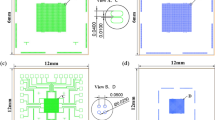Abstract
The stability of solder interconnects in a mechanical shock environment is crucial for large body size flip-chip ball grid array (FCBGA) electronic packages. Additionally, the junction temperature increases with higher electric power condition, which brings the component into an elevated temperature environment, thus introducing another consideration factor for mechanical stability of interconnection joints. Since most of the shock performance data available were produced at room temperature, the effect of elevated temperature is of interest to ensure the reliability of the device in a mechanical shock environment. To achieve a stable␣interconnect in a dynamic shock environment, the interconnections must tolerate mechanical strain, which is induced by the shock wave input and reaches the particular component interconnect joint. In this study, large body size (52.5 × 52.5 mm2) FCBGA components assembled on 2.4-mm-thick boards were tested with various isothermal pre-conditions and testing conditions. With a heating element embedded in the test board, a test temperature range from room temperature to 100°C was established. The effects of elevated temperature on mechanical shock performance were investigated. Failure and degradation mechanisms are identified and discussed based on the microstructure evolution and grain structure transformations.
Similar content being viewed by others
References
J. Glazer, Int. Mater. Rev. 40, 65 (1995).
D.R. Frear and P.T. Vianco, Metall. Trans. A 25A, 1509 (1994).
V. Fiori, K. Ewuame, S. Lallois-Garreignot, H. Jaouen, and C. Tavernier, Microelectron. Reliab. 54, 764 (2014).
H.G. Song, J.W. Morris Jr., and F. Hua, JOM 56, 30 (2002).
J. Savic, M. Nagar, W. Xie, M. Ahmad, D. Senk, A. Bansal, N. Islam, P. Oh, R. Pendse, H. Choi, and S.Lee, in Proceeding of IEEE 62nd Electronic Components and Technology Conference, San Diego, CA, 450–456 (2012)
H.K. Kim and K.N. Tu, Phys. Rev. B 53, 16027 (1996).
T.-K. Lee, T. Bieler, C. Kim, and H. Ma, in Fundamentals of Lead-Free Solder Interconnect Technology, Chapter␣6, (Berlin: Springer), 169–210 (2015)
JEDEC Standard JESD22-B111, July (2003)
B. Noh, J. Yoon, S. Ha, and S. Jung, J. Electron. Mater. 40, 224 (2011).
T.-K. Lee and W. Xie, J. Electron. Mater. 43, 4522 (2014).
P. Lall, R. Lowe, and K. Goebel, in IEEE 60th Electronic Components and Technology Conference, pp. 889–901 (2010)
W. Peng and M.E. Marques, J. Electron. Mater. 36, 1679 (2007).
L. Zhu and W. Marcinkiewicz, IEEE Trans. Compon. Packag. Technol. 28, 449 (2005).
T.-K. Lee, C. Kim, and T. Bieler, J. Electron. Mater. 43, 69 (2014).
T.-K. Lee, B. Zhou, T. Bieler, C. Tseng, and J. Duh, J. Electron. Mater. 42, 215 (2013).
T.-K. Lee, W. Xie, and C. Guirguis, in Proceeding of IEEE 65th Electronic Components and Technology Conference, San Diego, CA, 1560 (2015)
T.-K. Lee, J. Weld Join 32, 295 (2014).
G. Zeng, S.D. McDonald, J.J. Read, Q.F. Gu, and K. Nogita, Acta Mater. 69, 135 (2014).
K. Nogita, C.M. Gourlay, S.D. McDonald, Y.Q. Wu, J. Read, and Q.F. Gu, Scripta Mater. 65, 922 (2011).
Acknowledgement
This work was supported by an extended collaboration between Cisco systems, Component Quality and Technology group and Portland State University.
Author information
Authors and Affiliations
Corresponding author
Rights and permissions
About this article
Cite this article
Lee, TK., Chen, Z., Guirguis, C. et al. Impact of Isothermal Aging and Testing Temperature on Large Flip-Chip BGA Interconnect Mechanical Shock Performance. J. Electron. Mater. 46, 6224–6233 (2017). https://doi.org/10.1007/s11664-017-5650-2
Received:
Accepted:
Published:
Issue Date:
DOI: https://doi.org/10.1007/s11664-017-5650-2



